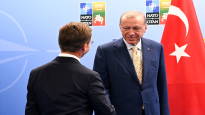Sweden’s entry into NATO still depends on how urgent President Erdoğan thinks it is.
President of Turkey Recep Tayyip Erdoğan on Monday sent Sweden’s NATO membership for parliament’s approval.
This news has been eagerly awaited both in Sweden, Finland and other NATO countries. Turkey is the last country whose parliament has not discussed Sweden’s membership. In Hungary, the issue has already been discussed, but not yet approved.
The exact schedule for Turkey is not known. Parliament’s decision-making can take a long time if the president does not think it is urgent. Still, it is inevitable that at some point Turkey will accept membership.
Why did Erdoğan decide to promote the issue right now? Many factors could have influenced the decision.
1. Turkey did what it promised
In July, during the NATO summit in Vilnius, Erdoğan promised that Turkey would accept Sweden as a member “as soon as possible”. It immediately became clear that due to the parliamentary break, the matter was moved to October.
So Turkey did as it promised, and is now taking the matter to the parliamentary hearing.
Sweden has been stuck in NATO’s lobby since July last year. Then NATO – and Turkey along with it – promised to accept Finland and Sweden as members of the alliance, as long as all countries have ratified their membership.
Finland’s papers were accepted by Turkey at the end of March, but Sweden’s application was left hanging.
2. The unstable situation in the Middle East is burdensome
Hamas’s terrorist attack on Israel started a reaction in the Middle East that may not be controlled by anyone.
Israel wants to destroy Hamas operating in Gaza. Hezbollah, an extremist organization operating in Lebanon, and Iran support Hamas. The United States, on the other hand, supports Israel and has sent aircraft carriers and anti-aircraft systems to the Mediterranean.
The situation in the Middle East is sparking right in the corners of Turkey. Accepting Sweden as a member is less of a hassle than leaving that issue undone in a difficult security policy situation.
3. Somewhere it has been possible to promote arms sales
Turkey has long had a headwind in fighter jet deals. The country flew out of the US F-35 program after buying the S-400 air defense system from Russia. Turkey had already acquired an aircraft carrier from which the F-35 fighters could take off. Now it’s just a drone flying platform.
The country is in dire need of new F-16 fighter jets and an upgrade to its old fighters. They are all in the pocket of the United States. In July, the United States promised that the deal would proceed.
Turkey said in September that it wants to agree on a sale of F-16 fighter jets before it can accept Sweden as a member. So far, no agreement has been made public.
4. Delaying Sweden’s membership is no longer beneficial
In Turkey, an autocratic president can dictate the pace at which Sweden’s NATO paper progresses. First, we waited for the Turkish presidential election, then the Swedish terrorism laws reform.
Turkey wanted one thing or another from NATO at the Vilnius summit in the summer to promote its own security or status.
In politics, things are often the currency of trade, so is Sweden’s membership.
– It may be that in foreign or domestic politics, this matter has nothing to win anymore. The negotiations have reached an end point in Bazaar, the leading researcher of the Foreign Policy Institute Charly Salonius-Pasternak said Ylen Ykkösaamu on Tuesday.
Turkey demanded that Sweden tighten its terrorism laws, but at the same time delaying NATO membership made Sweden a target for terrorists.
A terrorist shot two Swedes a week ago in Brussels, and according to the videos, the reason for the act was revenge against Sweden, which treats Muslims badly and burns Korans.
